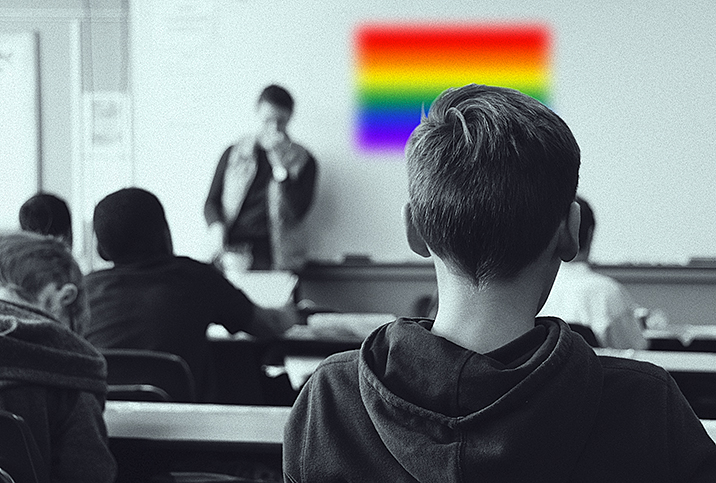A Triple Take On Conversion Therapy

"I don't think there is a softball question that you can ask about conversion therapy," said David Schlosz, Ph.D., a therapist with a private practice in Round Rock, Texas. Schlosz is also an adjunct professor at St. Edward's University and Texas State University. "If I had to give you any insight, I would say conversion therapy is destructive."
Conversion therapy is best known as the nonscientifically proven practice of attempting to change a person's sexual orientation (almost exclusively homosexual or bisexual) or gender identity (almost exclusively transgender) to a socially acceptable standard using psychological, physical and spiritual methods.
One of the reasons Scholsz focuses on helping patients recover from experiences with conversion therapy is not only due to a serious need for the service, but also because he lived through conversion therapy himself, including a yearlong residency program. His extended personal experience with the practice helped spark a personal and professional interest in addressing the problem from a properly therapeutic approach.
For context, conversion therapy is currently banned in 20 states and more than 100 municipalities in the U.S. In 2018, the American Psychiatric Association said it opposed "any psychiatric treatment such as 'reparative' or conversion therapy," and added that it "encourages legislation which would prohibit the practice of 'reparative' or conversion therapies."
Conversion therapy and churches
Donna Weinberger, CEO of Inspire Recovery in West Palm Beach, Florida, founded the company in 2015 to meet behavioral health care needs, specifically, general health care and addiction services within transgender and queer communities. They said the organization is committed to "trauma-informed, trans-affirming therapy" as part of their core mission.
Inspire Recovery primarily represents transgender, queer and nonbinary folks, but Weinberger also said a significant portion of the people who seek help from them are gay, cisgender men. They occasionally have clients who are lesbian-identifying, cisgender women, too.
"Some of them have experienced conversion therapy," Weinberger said. "Typically, for our clients, I would say 100 percent of the time it's been from religion, so, that's one of the traumas that our clients experience—religious trauma."
Weinberger said the people they work with also deal heavily with family trauma, but this is often connected to religious or ideological issues. There's a common theme here when it comes to the damage done by conversion therapy, and when the internal and external personal schisms mount, the problems can become deadly.
There's a common theme here when it comes to the damage done by conversion therapy.
"We had a trans female who was very confident and doing well for a while," Weinberger said. "And then she was struggling a bit, and she had given us a call and said, 'Hey I'm going to go to this Christian halfway house in Tampa and I'm going to de-transition.'"
They didn't have details from the person to elaborate what "de-transitioning" in this context meant.
"I guess what happened was she was also having problems at work, where they had told her she couldn't wear dresses or skirts any longer," Weinberger explained. However, they noted it didn't sound right based on their experience working with the community and trans identification. How trans people express themselves, they said, isn't normally subject to that kind of fluctuation without outside influence. Those influences instead often come in the form of familial or religious mentors, peers or role models applying pressure through shame and stigmatization.
"She [died] a week later," Weinberger said. "We drove across the state to her funeral and, ironically, it was the same exact priest or pastor who had that conversation with her [about de-transitioning]. Her family was there, and, of course, they were using incorrect names and pronouns. It was just very sad to see."
How conversion logic fails
Schlosz said religion plays a key role in the presence of conversion therapy camps and lectures around the country, but acknowledged churches are generally becoming less and less active in these efforts.
"I think the majority of people that go through conversion therapy are people who experience a crisis of identity with regard to reconciling their spiritual identity and their sexual identity," he said. "Historically, when it comes to the church or faith and sexual orientation, people have often felt that they have had to choose between the two. But this seems to be less and less true, in general, because different parts of the church, not the whole church, have progressed quite significantly."
Schlosz said the traditional logic employed in conversion therapy—especially with a religious angle involved—requires drawing connections between homosexuality and childhood abuse or neglect. Typically, conversion therapy tells gay men that their erotic "fixations" have to do with either being neglected or sexually abused by one parent or another. So, the notion from a religious standpoint is that homosexuality can be cured by "treating" the abuse.
However, this logic is in no way based on scientific causality. According to Schlosz, the statistical coincidence of increased sexual abuse or childhood neglect coinciding with homosexual identification or ideation does not mean the experiences of abuse or neglect are responsible for a person's sexual identity or desires.
"Conversion therapy is traumatic in its very nature because what you're being told is that who you are at your core is wrong," said Schlosz. "Think about it like this: When conversion therapy doesn't work, as it inevitably doesn't, the message that people get told is that they're not trying hard enough. That you don't want it bad enough. You're not praying hard enough."
Basically, conversion therapy has more or less a 100 percent failure rate, as well as many known negative consequences both internally and externally.
"When a person is developing their identity, and they are told at a young age that everything they're doing is wrong—and let's say it goes as far as conversion therapy—now that's when [negative] behaviors are going to form," Weinberger explained.
Trans, queer and nonbinary individuals can be vulnerable to problems such as drug addiction, potentially harmful sexual exploration and unsafe participation in sex work—when their identity is not affirmed through trauma-informed intervention and when real support is not available. Weinberger noted substance abuse and other risk-associated behaviors are particularly prevalent among the people they see in Florida.
It's also true these mounting traumatic impediments can prevent patients from the simple act of proactively seeking out answers to questions they have about sexual or reproductive health, for fear of not being taken seriously or shamed outright.
All of these issues together have a cumulative effect, but a strong sense of self-identity, self-concept and community can provide sturdy foundations for a person to do the personal work essential for growth, self-sufficiency and self-care. This foundation cannot develop when outside influences chip away at a person's overall well-being and sense of self.
Short and long-term consequences
"My dissertation was on the impact of conversion therapy on gay identity development, so I did a study interviewing 10 gentlemen from pretty much around the world," Schlosz said. "Seven of them were from the United States, one from New Zealand and two from the United Kingdom. They had all been through conversion therapy experiences." A key takeaway Schlosz found was that conversion therapy caused tremendous harm in the moment and in the years that followed, especially in social experiences, whether the conversion was in short- or long-term events.
"It's a group program, but nobody's admitting to just how badly they are faring," Schlosz explained. "So, it looks like it's working with Johnny, which means Johnny must be trying really hard, so if I try as hard as Johnny, it should work with me. But, the truth is, it's not working for Johnny, either. He's miserable because he feels like a failure."
Schlosz also described people who go to overnight or weekend conversion therapy or "camp" events. Some of them experienced demonic exorcisms, public shaming and bullying in front of an audience and were even cast out of the very events that were supposedly set up to help them.
"One participant was at a weekend retreat and did something wrong, although he wasn't even sure what it was," Schlosz recalled. "And the leader of the group, in front of everybody, called him a pervert and said that he clearly doesn't want to change badly enough and that he should just leave."
Conversion therapy caused tremendous harm in the moment and in the years that followed, especially in social experiences, whether the conversion was in short- or long-term events.
In some ways, these encounters confirm and exacerbate the long-held fears of a person struggling with their sexual orientation. Schlosz said this adds another layer of trauma on top of what is already a densely traumatic set of experiences.
"You grow up with a hyper-vigilance of not wanting anybody to see you give that second look or not letting your eyes linger too long anywhere," he said. "And then, you go into an environment where your behavior is really monitored and you are even more hyper-vigilant."
Schlosz described these environments as like a pressure cooker of potentially harmful social interactions, saying they represent "iatrogenic" conundrums in a person's path—that is, a person experiences harm and suffering from the very thing they're seeking to treat. He noted that these examples are extreme and do not happen at every conversion therapy practice.
"However, these [extreme examples] don't have to happen for it to be traumatic," Schlosz said. "Trauma can stem from just the very idea that such a natural, core part of who you are is wrong and needs to change."
Self-care and support for identity and orientation struggles
It's a dizzying and destabilizing experience even just to try to wrap your head around. And the internal chaos and social displacement can continue even after conversion therapy is over.
"There's this experience that many of the men had—it was that they were too gay to be 'good Christians,' so they're second-class Christians and always feeling less than," Schlosz said. "And, when they eventually give up on the conversion therapy experience, they're second-class gay citizens because they tried to change their orientation in the first place."
Being a part of any community is a critical component of a well-balanced life, and conversion therapy completely disrupts a person's ability to engage with said community. The main options many choose between are social isolation or an existential exit with no room for a middle ground in between.
For some people, conversion therapy might begin during childhood, coupled with possible shame and insecurity included, which can stimulate patterns of self-harm, bad choices or even suicidal ideations.
"It's unbelievable that conversion therapy is something that exists," Weinberger said. "It is something that kills people and there are no words for a parent or a religious organization or whoever the adults are that would point their kids to conversion therapy rather than life-saving interventions."
If you or someone you know is struggling with identity, questions or concerns about sexual orientation or sexual health choices—or anything else related to their physical or mental health, for that matter—the best course of action is to address these issues with a certified mental health professional who can provide or refer you/them to trauma-informed services, ideally with a multidisciplinary care approach.
In any healthcare decision, but also in regard to your sexuality, you should feel empowered to access and explore health services that actually meet your needs proactively and productively whenever possible. If you find yourself in the service of a coach, care provider or consultant of any kind whose values or principles you do not find aligned with your own, it may be wise to reconsider your options.




















